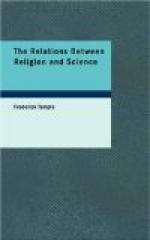In short, the unity of all things which Science is for ever seeking will be found not in the physical world alone, but in the physical and spiritual united. That unity embraces both. And the uniformity which is the expression of that unity is not a uniformity complete in nature, taken by itself, but complete when the two worlds are taken together. And this Science ought to recognise.
Let us turn from the physical to the spiritual.
The voice within us which demands our acceptance of religion makes no direct appeal to the evidence supplied by the senses. We are called on to believe in a supreme law of duty on pain of being lowered before our own consciences. And this law of duty goes on to assert its own supremacy over all things that exist, and that not as an accidental fact, but as inherent in its essence. And this supremacy cannot be other than an accidental fact unless it be not only actual but intended. And intention implies personality; and the law thus shows itself to be a Supreme Being, claiming our reverence, and asserting Himself to be the Creator, the Ruler, and the Judge of all things that are. And this same voice within us asserts that we are responsible to Him for all our conduct, and are capable of that responsibility because free to choose what that conduct shall be. We are to believe not because the truth of this voice is proved independently of itself, but simply because we are commanded. Corroborative evidence may be looked for elsewhere, but the main, the primary evidence is within the soul.




